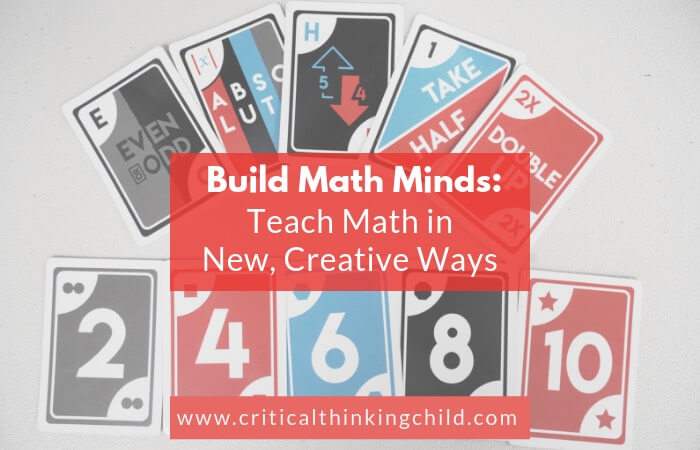Recently, I was featured as a guest on Build Math Minds, a popular podcast for parents and teachers who want to teach math in new and creative ways. It was such an honor to sit down with Christina to discuss the different ways we can make math fun and accessible. Here are some of the main takeaways and resources featured in the episode and this amazing COMP10 math game.
Focus on understanding over memorization
Many students are identified as gifted based on early math skills. They know their addition facts before kindergarten and their multiplication facts by 1st grade. This seems impressive, but unfortunately, these students don’t always test well or excel in higher level math.
This is because that early math knowledge is rooted in the memorization of information, rather than developing true foundational skills. It’s so important that children understand why they are doing something, rather than just memorizing numbers. The more they practice understanding word problems, looking at keywords for clues, and drawing out the problem to get the answer, the stronger their foundation will become.
Number Sense 101
In the podcast, I share that as a working parent, I wanted to continue to learn how best to help my children at home. I couldn’t always travel to a workshop or shell out tons of money for books and resources — especially when I didn’t know for sure if they would help.
After a lot of research, I found Number Sense 101 through Build Math Minds. This online course for busy parents helped me set the foundation for math instruction. It showed me where to start. For example, one foundational skill I took from this course is the concept of subitizing. Subitizing, or knowing “how many” without counting, is the building block of many more complex mathematical concepts. Learning about subitizing changed the game for me.
Think about big picture math skills
Christina and I also talked about the importance of thinking about the whole picture. Often, we can get caught up in focusing on one specific skill, instead of looking at where that skill falls on a larger learning trajectory. For example, instead of getting caught up in one multiplication fact, you can think about how this fact could be used in a word problem, or in conjunction with a previously learned skill, like addition.
When teaching children, try to incorporate multiple learning styles like visual learning with pictures and kinesthetic learning with building and math tools. It’s also essential that school and home are a partnership, so parents should always work with teachers to reinforce school concepts at home.
Deepen rather than accelerate
When gifted children excel, they are often simply handed the math curriculum for the next grade. But acceleration doesn’t always meet their needs. Serving gifted students doesn’t have to be about going onto the next concept. Instead of working your way up the standards, think of ways to deepen grade level standards to make sure students have a really solid understanding. This can be done through real world problem solving or group projects, which gives gifted students an opportunity to interact with their grade-level peers.
Leverage games to make learning math fun
Although some parents and teachers are wary of using games to teach math concepts, they are actually a great way to engage kids in learning math. Build Math Minds works to collect, test, and share math games and Evergreen Games has a large selection of games that will last for years. Games will keep your children interested, engaged, and learning while having fun!
It was so wonderful to sit down with Christina and talk with her about the exciting ways The Critical Thinking Child works to strengthen children’s confidence in math. Make sure you give the entire interview a listen, and follow Christina’s podcast for more amazing insights.



